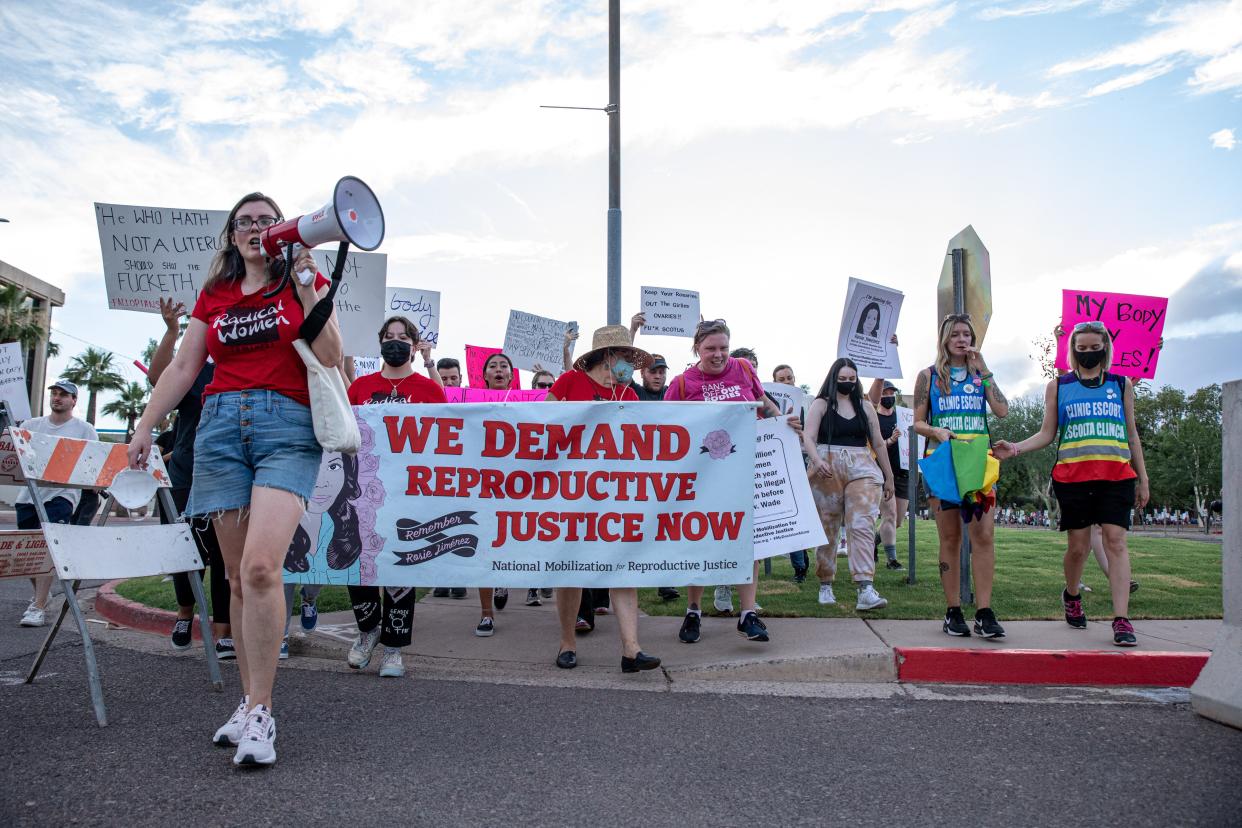Will Arizona outlaw nearly all abortions? What to know about upcoming court case

- Oops!Something went wrong.Please try again later.
A legal ruling expected as soon as this week could mark the end of nearly all legal abortions in Arizona, throwing women's reproductive rights back to where they stood in 1864.
Abortion advocates and foes have waited anxiously since last month for Pima County Superior Court Judge Kellie Johnson's decision on whether to reinstate a pre-statehood abortion ban.
The old law mandates two to five years in prison for abortion providers, with an exception to save the life of the mother. An injunction in 1973 blocked its enforcement, but state Attorney General Mark Brnovich asked the Pima County court to lift the injunction after the U.S. Supreme Court overturned Roe v. Wade in June.
Johnson said Aug. 19 that she would rule within 60 days on the request, with a ruling coming no sooner than Sept. 20.
Even if she keeps the injunction in place, a law signed by Gov. Doug Ducey this year that bans abortions after 15 weeks of gestation, with no exception for rape or incest, takes effect Saturday. About 97% of abortions in 2020 occurred before 15 weeks, but abortion advocates see the law as an unconstitutional imposition on women's rights.
Letting the pre-statehood law take effect could shutter all legal abortion clinics in Arizona.
Most clinics in the state already have limited their services following the Supreme Court's ruling, out of fear of potential prosecution. Besides the 1864 law, the Republican-led Legislature passed a law last year that conveyed personhood rights to fetuses, though that provision was put on hold by a federal judge.
Planned Parenthood Arizona, whose attorneys are opposing the Republican attorney general's move, is fighting to make the injunction against the 1864 law permanent.
More: Planned Parenthood Arizona is resuming abortion care, but for now only in Tucson
They argue that a series of abortion-related laws enacted over the years since 1973 essentially create a right to abortion. The state's lawyers maintain that those laws were passed only because of the limitations set by Roe v. Wade, and that the pre-statehood law should be reinstated now that Roe's no longer in effect.
Whoever loses is likely to appeal Johnson's ruling, keeping the question of the 1864 law in play for months to come.
'Momentous' decision from judge
Brittany Fonteno, president and CEO of Planned Parenthood Arizona, said the Johnson's decision — whichever way it goes — will be "momentous" for all Arizonans.
"Reproductive freedom is really hanging on by a thread in this state," she said.
Planned Parenthood will likely ask for a continued injunction while the case is on appeal, should the ruling go against them, she said.
If Johnson rules against Brnovich, on the other hand, Planned Parenthood could resume abortion care in metro Phoenix within days, and later in the rest of the state, Fonteno said.
Prior to the Dobbs ruling, Planned Parenthood provided abortions at four of its seven locations in the state, including Tucson, Flagstaff and Glendale.
The organization restarted surgical and medical abortions in Tucson last month after Brnovich's office agreed at the Aug. 19 hearing that the injunction was currently in effect — a fact that Brnovich and Maricopa County Attorney Rachel Mitchell had publicly questioned.
Asked for a comment on the pending ruling, Brnovich's office released something similar to previous statements: "The Arizona Legislature has consistently re-affirmed our existing law prior to Roe v. Wade, most recently with legislation passed by lawmakers and signed by the governor earlier this year. We look forward to the court providing clarity and uniformity for all Arizonans."
More: Where Sen. Mark Kelly and GOP challenger Blake Masters stand on 15-week abortion bill
Outcome could affect election
Johnson's imminent ruling could affect the midterm election in Arizona, where many statewide and legislative races feature a stark choice between anti-abortion Republicans and pro-abortion Democrats.
The Supreme Court's June decision in Dobbs vs. Jackson Women's Health Organization has rallied women and liberals against candidates, throwing headwinds into what some predicted would be a Republican "wave" at the polls.
The Dobbs decision, which put abortion policies in the hands of state leaders, brought "real consequences" to the abortion debate, said Republican political consultant Barrett Marson.
"Voters, especially women, are taking a real look at candidates' stances on abortion because political leaders can now write abortion laws that grant or restrict access," he said.
If the 1864 law finds approval in Arizona courts before the midterm, "Democrats would have a field day," Marson said.
"The Supreme Court made midterms competitive," Fonteno said, noting that some Republican candidates have tried to soften their stances on abortion since the primary election.
Reach the reporter at rstern@arizonarepublic.com or 480-276-3237. Follow him on Twitter @raystern.
Subscribe to azcentral.com today.
This article originally appeared on Arizona Republic: Ruling on Arizona law banning abortions expected soon from Pima County

